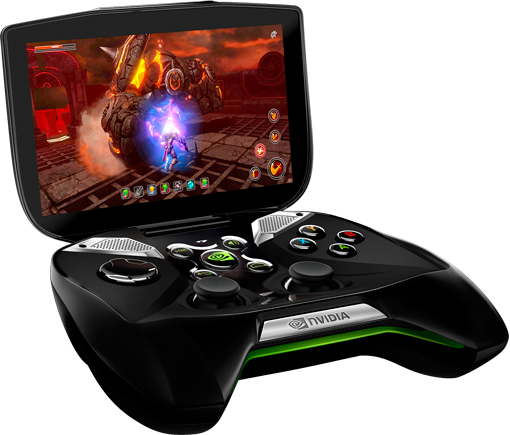If you’re looking for yet another way to enjoy your mobile Android games, NVIDIA has just announced a new portable console that is worth looking at. Project SHIELD is NVIDIA’s take on the portable gaming market: it features a full-sized gaming controller, the latest version of Android and PC connectivity.
The first thing that users will notice is the new controller: it looks nothing like a mobile controller, instead it has the appearance of one you’d find on a standard gaming console, such as the PlayStation 3 or the Xbox 360. Right above it there’s a compact 5-inch multi-touch 720p high-definition display. It runs the latest version of Android, code named Jelly Bean, with all of its standard features, so aside from running all Android games, it can also work as a standard Android device. Aside from all of the everyday games available from the Play Store, SHIELD will also include its own app store, known as NVIDIA TegraZone, which is expected to feature specifically-designed games for this form factor. And to top everything off; it’s powered by NVIDIA’s latest Tegra 4 SoC, which is a quad-core A15 chip and has custom 72-core GeForce GPUs.
In a press release, NVIDIA co-founder and CEO Jen-Hsun Huang explained that the company is aiming to make as much of a “splash” in the gaming market as much as the Amazon Kindle made in the e-book market and the iPad in the tablet market:
"We were inspired by a vision that the rise of mobile and cloud technologies will free us from our boxes, letting us game anywhere, on any screen. We imagined a device that would do for games what the iPod and Kindle have done for music and books, letting us play in a cool new way. We hope other gamers love SHIELD as much as we do."
More than supporting Android games, Project SHIELD also includes features that may be very appealing to PC gamers. For users with a supported NVIDIA GeForce graphics card, they will be able to use the device as a controller for PC games, on their PC. Many title seem to be supported, including Steam games, such as Portal 2. Even more exciting, for certain supported games (a list that will almost certainly grow), the video output can be broadcast to the SHIELD’s screen, creating a truly wireless experience.
There’s no word on pricing on availability as of yet, however reaction from the gaming industry, as well as gamers, has been so far very enthusiastic. It remains to be seen whether NVIDIA will be able to keep the hype alive.
You can follow us on Twitter, add us to your circle on Google+ or like our Facebook page to keep yourself updated on all the latest from Microsoft, Google, Apple and the web.

